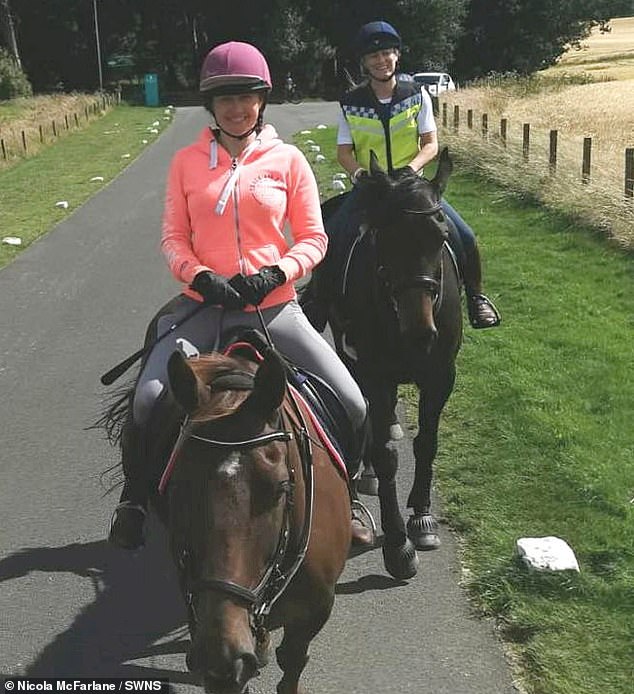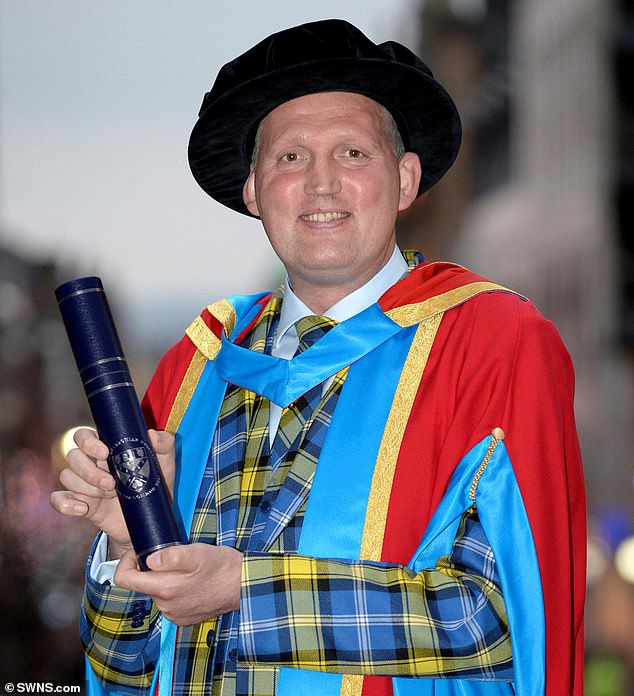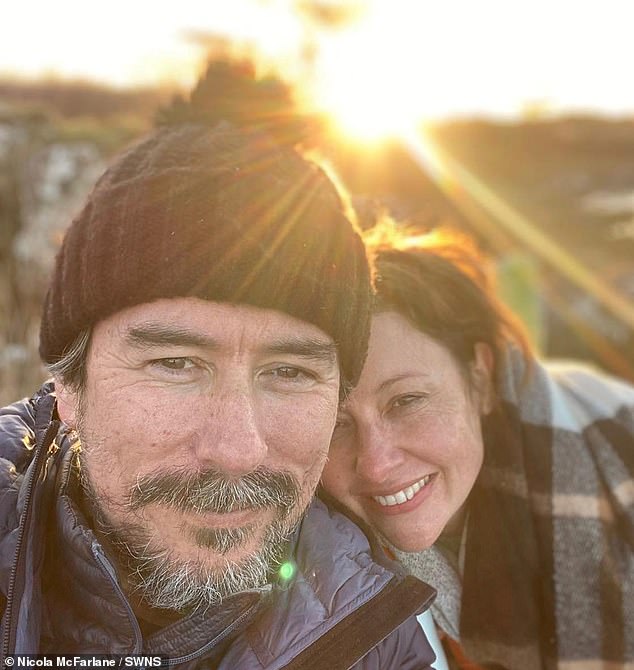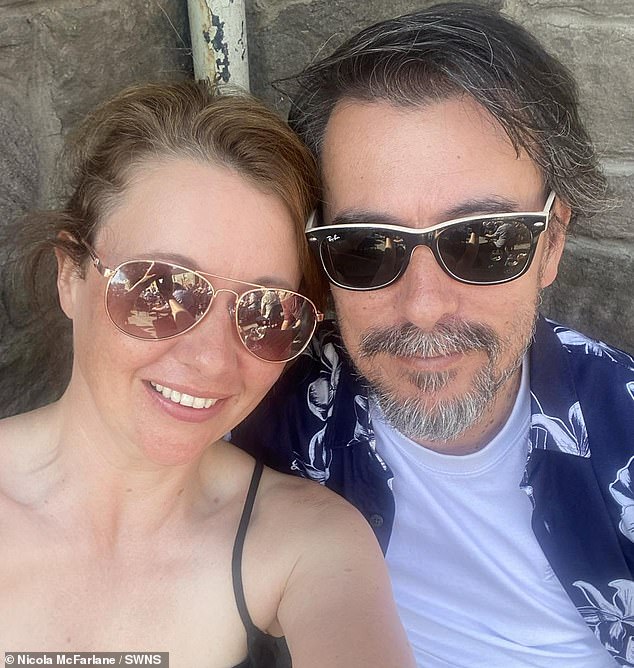I thought I had coffee cravings, but it turned out to be motor neurone disease: Heartbreaking diagnosis from 47-year-old woman who says it ‘was like being hit by a train’
A woman who attributed her shakes to caffeine jitters has revealed it was actually a sign of motor neurone disease.
Nicola McFarlane from Dunblane, Scotland, first noticed a tingling sensation throughout her body in 2022.
However, the 47-year-old had recently started a new job, so put that down to the extra stress she was under and drinking more coffee than usual.
Mrs McFarlane started noticing loss of strength in her hands when they got cold last year, so she turned to her GP.
Within a few weeks, she was diagnosed with MND, the most common form of which is amyotrophic lateral sclerosis (ALS).
Ms McFarlane is now working with an MND charity in a bid to raise awareness of the condition.
Nicola McFarlane, 47, from Dunblane, Scotland, first experienced a tingling, shaking sensation throughout her body, which she thought was due to drinking too much coffee and stress

A lifelong equestrian and lover of the outdoors, Mrs McFarlane struggled to cope with the diagnosis and the impact the disease would have on her life.
Mrs McFarlane said: ‘I went to the doctor because I started noticing muscle wasting in my hands – and of course I did some Googling.
‘I had problems with fine motor skills. I also noticed that when I lay in bed and tried to fall asleep, I would notice tingling sensations all over my body.
“At the time I blamed it on the fact that I had just started a new job and was drinking too much coffee.”
She was referred to a neurologist and diagnosed with ALS within two weeks.
‘It was like being hit by a train. There’s not really anything that can prepare you for being told you have ALS,” Ms McFarlane said.
MND is a rare condition that damages the nervous system over time, resulting in problems walking, speaking and breathing as the condition progresses.
Around 5,000 adults in Britain have ALS and there is a one in 300 risk of developing the condition over the course of a person’s lifetime.
Muscle twitching and a weak grip are among the first signs of ALS, along with weakness in the leg or ankle, slurred speech and weight loss.
Some tremors are normal and can be caused by caffeine, stress and age.
There is no cure, but doctors can provide treatments to reduce its impact on a person’s life.
Mrs McFarlane struggled with the diagnosis and worried about the impact the disease would have on her life.
Looking for support, she came across My Nam5’s Doddie Foundation – a charity founded by Scottish rugby player and ALS patient George ‘Doddie’ Weir.
The athlete announced his diagnosis in 2017 and founded his charity that year. He died in 2022. The organization invests in ALS research with the aim of finding a cure.
Mrs McFarlane said: ‘After my diagnosis I found myself in a very dark situation, but thinking of Doddie and everything he achieved helped me get out of it.
‘It wasn’t until about a month after I was diagnosed that I read a quote from Doddie Weir, which said: “This is the hand of cards I’ve been dealt and I just have to get on with it”.
‘That really appealed to me. I think his attitude and achievements, despite the mental and physical impact of the disease, have given me a lot of strength.
‘I got a lot of inspiration from Doddie. When he was diagnosed, his attitude was: why is there no treatment or cure?
“If you have ALS, you just want hope for treatment.”
She has teamed up with My Nam5’s Doddie Foundation to raise awareness of the charity’s annual Doddie Aid fundraising event.
The campaign is encouraging people across the country to sign up to the Doddie Aid app and log as many miles as possible while running, swimming or even walking the dog.
The event has raised more than £4 million and traveled more than 8 million miles over the past two years, with profits funding research into a cure for ALS.
Ms McFarlane said she plans to continue fighting for ALS awareness, together with her friends and her partner Paul van Baardwijk.

My Nam5’s Doddie Foundation – a charity founded by Scottish rugby player and ALS patient George ‘Doddie’ Weir, pictured, has given hope to many people with the disease

Ms McFarlane (pictured right) plans to continue fighting for ALS awareness alongside her loving friends and partner Paul van Baardwijk (pictured left)
She said: ‘There is a lack of awareness and funding for the disease – but this is a charity mainly focused on research, and that gave me some hope.
‘There seems to be a misconception that only old people get ALS. It seems to be more common in older men, but women absolutely get it and it’s not as rare as people think.
‘It is considered rare because people tend to die quite quickly if they get it. I think social media is full of images of people in their final stages of ALS.
‘But when you are first diagnosed, you are not yet at that stage. You still have time, even if it varies.”
Life expectancy is usually two to five years from the time symptoms first begin.
Ms McFarlane still works full-time, but says she is aware that she will eventually need palliative care.
“I try to take it day by day and not look too far into the future because then I get very overwhelmed and terrified,” she said.
‘It is a disease characterized by loss; my whole life revolved around horse riding, camping, wild swimming, being outdoors and being active.

Mrs McFarlane still works full-time and is not yet ready for palliative care, although she is aware that this will come.
‘It’s about adapting and finding things you can still do and enjoy. It is very difficult.’
When people are diagnosed with MND, they are told there is no cure. However, the charity hopes to one day find one through the clinical trials it funds.
“As Doddie said, this is not an incurable disease, it is an underfunded disease. Funding for clinical trials and treatments may be possible,” Ms McFarlane said.
‘Will that happen in my lifetime? I don’t know, but future generations deserve the option of treatment.”
Paul Thompson, fundraising director at My Name’5 Doddie Foundation, said: ‘The outpouring of emotion and support since Nicola told her story to help launch this year’s Doddie Aid has been something to behold. She reminds us all why we do this.
“Doddie dedicated his final years to advancing the ALS cause, and we owe it to him, Nicola, and everyone living with the disease to continue his legacy and not stop until we live in a world that is free from ALS.’
He encouraged people to sign up Doddie Aid to participate in this year’s event.
